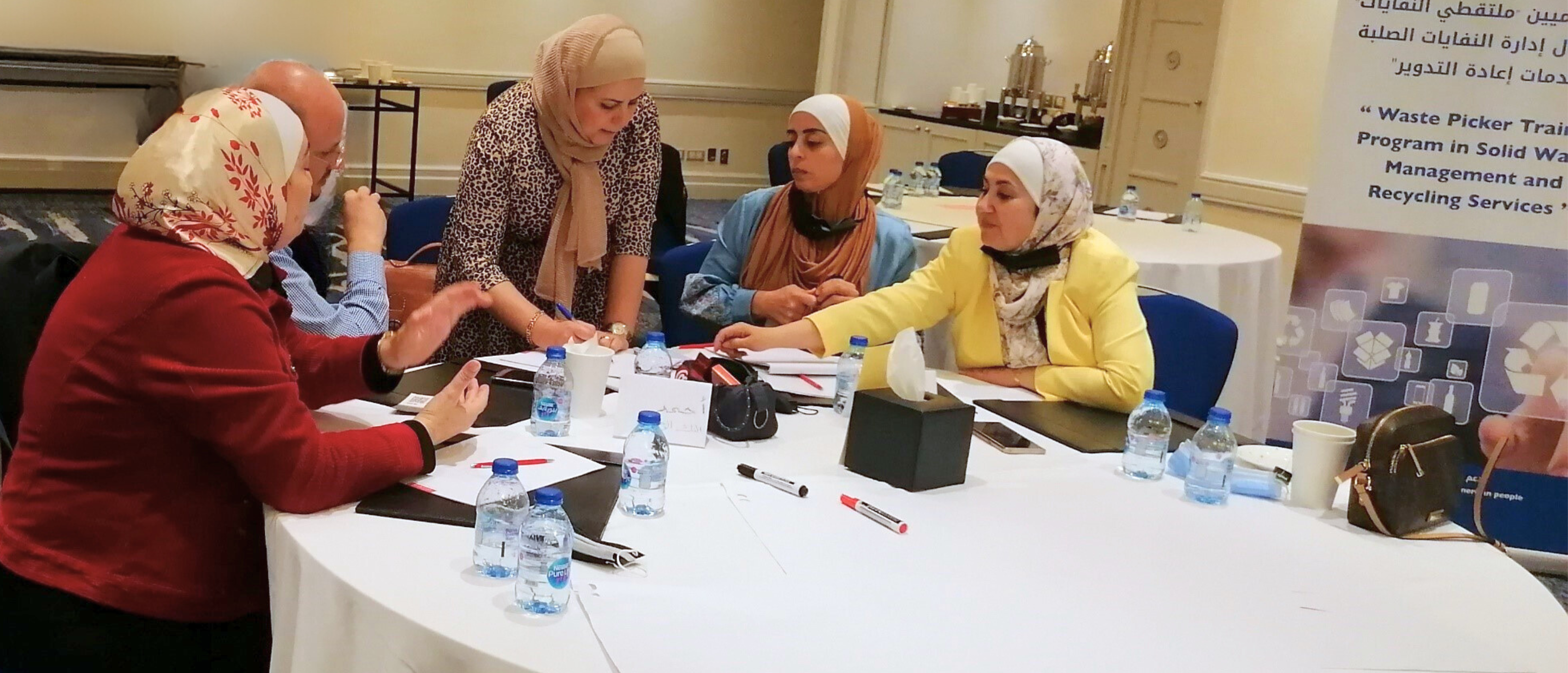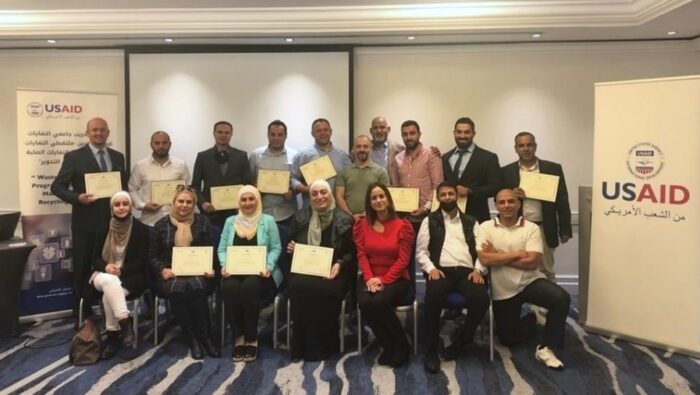
Rethinking Recycling Norms: Improving Economic Outcomes, Safety, and Business Inclusivity in Jordan
More than 2.2 million tons of solid waste is generated in Jordan each year. Unfortunately, only 8-10 percent of this amount is recycled[1] due to poor universal recycling practices. In the capital of Amman, the Al Ghabawi landfill receives 3,200 tons of waste each day. At the same time, Amman’s waste generation is increasing by more than five percent per year and its recycling rate falls well behind other cities in the region[2].
Banyan Global is a subcontractor to Chemonics International on the United States Agency for International Development (USAID)-funded Recycling in Jordan Activity. The Activity works with private recycling firms, the commercial sector, and the Government of Jordan to increase commercial sector usage of recycling services in Amman. Banyan Global supports Gender Equality and Social Integration (GESI) services to ensure project interventions are inclusive of women, and marginalized groups, such as informal waste pickers, people with disabilities, youth, and refugees.
In collaboration with Chemonics International and Jordan Environment Society (JES), Banyan Global leads the USAID-funded Waste Picker Training and Certification Program. The program targets informal waste pickers who are making their livelihood by collecting, sorting, recycling, and selling the generated waste from residential and commercial sectors.[3] While informal waste pickers play an important role in recycling and in the local economy, globally they have a low social status and often live and work in difficult conditions that compromise their health and safety. Women recyclers and waste pickers particularly face a wide range of common structural and gendered barriers that impede their full participation in the traditionally male-dominated Waste Management and Recycling (WMR) sector. Gender integration in the WMR sector globally has to a large extent been negligible.[4] The Waste Pickers Training and Certification Program aims to improve waste pickers’ technical knowledge and soft skills in order to increase their potential engagement in municipal recycling programs and formal collection schemes.

Training of Trainers for the Waste Pickers Training and Certification Program in Amman
In Fiscal Year (FY) 2022, a total of 340 informal waste pickers (308 men and 32 women) were certified through 13 cohorts of the 25-hour training program. Forty percent of the participants were ages 18-29 and 39 percent were ages 30-49. The training focuses on improving the waste pickers’ knowledge of the technical, health and safety, financial, social, and environmental aspects of waste picking and access to waste. It also strengthens their skills around effective communication strategies; gender equality and gender-based violence (GBV) awareness and GBV prevention; and entrepreneurship.
Based on participant survey responses[5], the training successfully met the goals and metrics set forth by the project:
- 83 percent of respondents from the first cohort said the training program contributed to improving their income
- 77 percent confirmed the training program supported them in accessing new waste generators and created market linkages
- 97 percent confirmed the program improved their occupational health and safety knowledge and practices.
- 99 percent said the training program improved their understanding of the recycling market.
- 77 percent confirmed the training program contributed to creating more jobs in the market.
“The most interesting topic for me during the five-day training was the soft skills module. I learned how to behave and present myself in a good manner. Communication skills are vital for us to deal with the waste generators and the shops’ owners and build a partnership with them.”
– Male waste picker training participant
Particularly important was the positive impact the training had on changing the stereotypes about women’s participation in the male-dominated waste and recycling sector by empowering and building the capacity of female trainees and trainers alike. Although there were far fewer female participants, the experience encouraged everyone to think outside the box to explore new ideas and improve traditional methods of sorting recyclables. The Activity also communicated the essential need for female trainers and created opportunities for them to deliver the training program. During the year, two Jordanian female trainers trained three out of thirteen cohorts, earning positive feedback from male and female trainees alike.
“We need to cancel the culture of shame. Women should become bolder by working in fields we normally shy away from.”
– Female waste picker training participant
The Waste Picker Training and Certification program provided critical knowledge and skills to support informal waste pickers to improve their lives and livelihoods while strengthening recycling in Jordan. The USAID Recycling in Jordan Activity will continue its efforts to strengthen the capacity of this marginalized group with an aim of building a safer, more profitable, inclusive and competitive recycling sector in Amman.
[1] “Kingdom Embarks on Long Road to Sustainable Waste Management.” 2021. Jordan Times. February 16, 2021. https://www.jordantimes.com/news/local/kingdom-embarks-long-road-sustainable-waste-management.
[2] “Transforming Jordan’s Recycling Industry.” Chemonics International. https://chemonics.com/projects/transforming-jordans-recycling-industry/.
[3] “Waste Pickers.” Women in Informal Employment: Globalizing and Organizing (WIEGO), https://www.wiego.org/waste-pickers
[4] Municipal Waste Management and Recycling WE3 Gender Analysis Report, https://banyanglobal.com/wp-content/uploads/2019/06/Municipal-Waste-Management-and-Recycling-WE3-Gender-Analysis-Report.pdf
[5] Of the 167 waste pickers who completed the training in the first seven cohorts that were surveyed, 118 participated in the survey.
